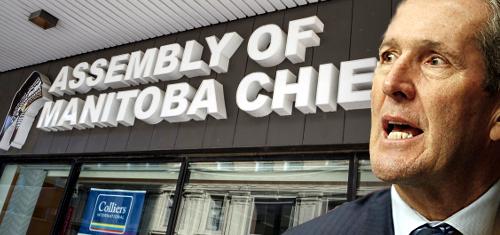 Tribal casino operators in the Canadian province of Manitoba say the provincial government can’t tell them where they can or cannot locate their gaming business.
Tribal casino operators in the Canadian province of Manitoba say the provincial government can’t tell them where they can or cannot locate their gaming business.
Last week, Manitoba Premier Brian Pallister (pictured) gave an “absolutely no” response to a request by the tribal operators of the Aseneskak Casino near The Pas to relocate their struggling gaming business to the grounds of the Assiniboia Downs racetrack just outside the capital Winnipeg.
On Thursday, the Assembly of Manitoba Chiefs (AMC) issued a statement saying “In no uncertain terms is it acceptable for the Pallister government to undermine and unilaterally dismiss the Aseneskak Casino board request to relocate their casino.”
Grand Chief Derek Nepinak took particular issue with the fact that Pallister had chosen to deliver his response to the media. “If the province has a policy, they should be talking to us, rather than passing policy through the newspaper.”
In June, Nepinak publicly expressed hopes of having a better relationship with Pallister’s newly elected Tories than the AMC had enjoyed with the previous NDP government, which the AMC accused of favoring commercial casino operators when it came to casino site selection.
On Thursday, Nepinak offered numbers to support this stance, saying the government-run casinos were “making $300m a year … meanwhile our casinos are really struggling.” Nepinak accused the provincial gaming monopoly, Manitoba Liquor & Lotteries, of being “biased against First Nations, and the province is in a position of conflict of interest.”
Nepinak isn’t alone in stressing the conflicted nature of provincial gaming monopolies, which act as both operator and regulator. These monopolies are among the largest contributors to government budgets, and thus the pressure to maintain revenue contributions means regulatory curbs often go out the window, as evidenced by British Columbia’s shockingly poor record at policing money laundering at its casinos.
The Aseneskak Casino’s operators say their current location doesn’t have the population base to make the business financially viable. Aseneskak CEO Suzanne Barbeau-Bracegirdle claims the property hasn’t turned a profit in 10 years, leaving it with two options: relocate or close.
SIGA UNVEIL LLOYDMINSTER CASINO PLANS
Just across Manitoba’s western border, the Saskatchewan Indian Gaming Authority (SIGA) has unveiled plans for its new casino near Lloydminster. SIGA CEO Zane Hansen said the 31k-square-foot venue would provide 140 “very good, well-paying jobs, good, solid, dependable jobs.”
The project is still a long way from putting shovels to dirt, but Chief Wayne Semaganis of the Little Pine First Nation said soil testing and site markings were already underway and he hopes the foundation can be laid in December. The property will be the province’s seventh tribal casino.